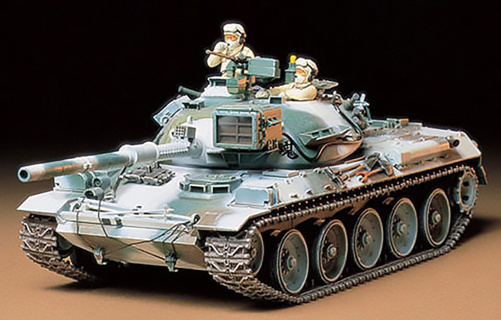Type 74 Tank Winter Version
Item No. 35168
Soon after the Japanese Type 61 tank was put into service, the Ground Self Defence Force and the Japanese Defence Agency began development and design of their next tank. Thorough research was conducted to produce a tank that could fulfil the demands of a modern fighting vehicle. Two experimental pro
Description
Soon after the Japanese Type 61 tank was put into service, the Ground Self Defence Force and the Japanese Defence Agency began development and design of their next tank. Thorough research was conducted to produce a tank that could fulfil the demands of a modern fighting vehicle. Two experimental prototypes were built during 1968 for basic study, which were followed by improved evaluation prototypes in 1970. Following extensive testing and modifications, the final tank version was officially adopted as the Type 74 in September 1974. The tank featured the NATO standard type L7A1 105mm main gun, that was produced by the Vickers company in Great Britain. This gun uses a coaxial buffer, developed by the Japan Steel Works Ltd. The main gun unit is mounted in a low profile cast steel turret and matched to the latest fire control system, comprised of a laser range finder, trajectory computer and gun stabilizer. An infrared viewer is also used for efficient night operations. The running power for the Type 74 tank is supplied by Mitsubishi Heavy Industries Ltd. And is the Type 10ZF22WT, air cooled, V10 cylinder 2-stroke diesel engine, which is capable of 720 horsepower. The air and hydraulic suspension system incorporates a height control system to lower its profile even more during stationary combat conditions. For deploying in snowy areas, the tank is camouflaged in white and green, and carries winter equipment such as crew's skis, etc
Type 74 Tank Winter Version
Item No. 35168
Soon after the Japanese Type 61 tank was put into service, the Ground Self Defence Force and the Japanese Defence Agency began development and design of their next tank. Thorough research was conducted to produce a tank that could fulfil the demands of a modern fighting vehicle. Two experimental pro
Description
Soon after the Japanese Type 61 tank was put into service, the Ground Self Defence Force and the Japanese Defence Agency began development and design of their next tank. Thorough research was conducted to produce a tank that could fulfil the demands of a modern fighting vehicle. Two experimental prototypes were built during 1968 for basic study, which were followed by improved evaluation prototypes in 1970. Following extensive testing and modifications, the final tank version was officially adopted as the Type 74 in September 1974. The tank featured the NATO standard type L7A1 105mm main gun, that was produced by the Vickers company in Great Britain. This gun uses a coaxial buffer, developed by the Japan Steel Works Ltd. The main gun unit is mounted in a low profile cast steel turret and matched to the latest fire control system, comprised of a laser range finder, trajectory computer and gun stabilizer. An infrared viewer is also used for efficient night operations. The running power for the Type 74 tank is supplied by Mitsubishi Heavy Industries Ltd. And is the Type 10ZF22WT, air cooled, V10 cylinder 2-stroke diesel engine, which is capable of 720 horsepower. The air and hydraulic suspension system incorporates a height control system to lower its profile even more during stationary combat conditions. For deploying in snowy areas, the tank is camouflaged in white and green, and carries winter equipment such as crew's skis, etc

